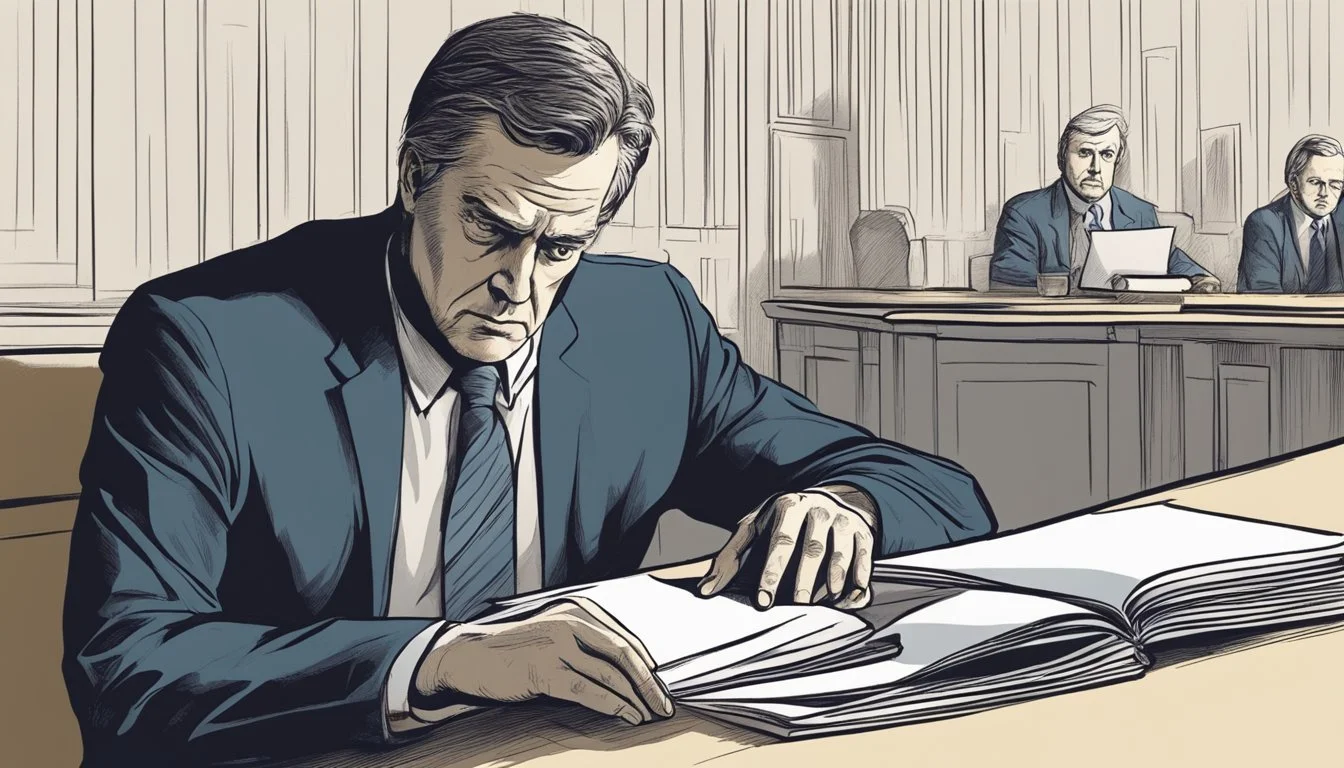7 Ways Trauma Can Impact Your Relationship with Writing
Understanding Emotional Barriers
Trauma has profound effects on many facets of life, including the way individuals engage with writing. When someone experiences trauma, it doesn't only live in their mind but often permeates their creative and expressive outlets.
Understanding how trauma intertwines with writing can offer valuable insights for both those who have experienced trauma and those who work with them. This article examines the intersection between trauma and writing, shedding light on how past experiences influence current writing habits and attitudes.
1) Increased Self-Doubt
Trauma can significantly affect an individual's confidence, making them question their abilities more frequently and deeply. When it comes to writing, this increased self-doubt can manifest as a pervasive feeling of inadequacy.
Individuals might find themselves constantly second-guessing their ideas and skills. Even when they possess ample talent and knowledge, the lingering effects of trauma can cloud their self-assessment.
This heightened level of self-criticism can lead to a struggle with starting or completing writing tasks. The fear of failure or producing inadequate work can paralyze progress, leaving many projects unfinished or even unbegun.
Moreover, feedback from others, which is often a critical part of the writing process, can be more challenging to handle. Constructive criticism may be interpreted as personal failure, intensifying feelings of inadequacy and self-doubt.
In some cases, individuals may avoid writing altogether, fearing they won't meet their own expectations or those of others. This avoidance only deepens the cycle of self-doubt and reinforces negative self-beliefs.
Increased self-doubt can be particularly problematic in professional settings where writing is essential. The pressure to perform well might exacerbate feelings of anxiety, reducing overall productivity and creativity.
For more insights on how trauma affects various aspects of life, including relationships, consider reading about the 7 Hidden Effects of Trauma.
2) Perfectionism
Perfectionism can be closely tied to trauma, influencing how individuals approach their writing.
Many people who have experienced trauma develop a desire to maintain control. This often manifests as needing their writing to be flawless. They may edit excessively, afraid of making even minor mistakes.
Perfectionism can hinder a writer's productivity. It can lead to excessive time spent on small details, preventing the completion of projects.
Writers may also avoid starting new projects due to fear of imperfection. This self-imposed standard can create significant stress and anxiety around writing tasks.
In relationships, perfectionism can cause self-doubt. Writers might feel that their work is never good enough, affecting their confidence and willingness to share their writing with others.
The relationship between trauma and perfectionism in writing is complex. Addressing these underlying issues can help alleviate the pressure to be perfect.
3) Fear of Judgment
Trauma can lead to a deep-seated fear of judgment when putting thoughts on paper. This fear can stifle self-expression as individuals worry about how their writing will be perceived by others.
Those who have faced trauma might hesitate to share their stories, fearing negative feedback or misunderstanding. This fear can become a significant barrier to using writing as a healing tool.
People may feel anxious about exposing their vulnerabilities. They worry that their experiences will be judged harshly or not taken seriously. Such apprehension can inhibit the free flow of writing.
The pressure to meet internal or external expectations can further exacerbate this fear. Trauma survivors may struggle with perfectionism, fearing that any imperfection will attract criticism. This can make writing a daunting task.
Even in private journaling, the fear of being judged by imagined future readers can loom large. Overcoming this fear often requires building a safe and supportive writing environment.
By addressing these fears gradually and seeking compassionate feedback, individuals can begin to rebuild their confidence in expressing their experiences through writing. Emphasizing the personal and therapeutic value of writing, rather than its reception by others, can help reduce the impact of judgment fears.
4) Avoidance of Writing
Individuals who experience trauma may develop an aversion to writing. This is often due to the emotional pain associated with revisiting traumatic memories. Writing, which once was a source of creativity or expression, can become a trigger for distressing emotions.
This avoidance can manifest as procrastination or complete cessation of writing activities. The fear of confronting painful experiences may lead to writer’s block, making it difficult to begin or continue writing projects.
For some, writing can feel overwhelming and unmanageable. This sense of dread can prevent them from engaging in any form of written expression. The cycle of avoidance can create significant barriers to communication and self-expression.
Trauma survivors might find themselves disconnected from their thoughts and feelings. This disconnection can make it challenging to articulate emotions or experiences on paper.
Addressing this avoidance requires a supportive environment. Trauma-informed approaches in writing pedagogy, such as creating psychologically safer classroom spaces, can assist those affected by trauma in gradually re-engaging with writing activities.
Understanding that avoidance is a common response can be the first step in overcoming this obstacle. By recognizing and addressing the emotional barriers, individuals can slowly rebuild their relationship with writing. For more on supportive strategies, explore this guide to trauma-informed writing.
5) Vivid Flashbacks
Vivid flashbacks can significantly impact an individual's relationship with writing. These flashbacks are intense and often overwhelming, transporting the person back to the traumatic event.
Such experiences can disrupt the creative flow, making it challenging to focus on writing tasks.
Flashbacks may cause a writer to avoid certain topics or themes that trigger these memories.
This avoidance can limit the range of subjects they feel comfortable exploring, stifling their creative expression. Understanding and recognizing the triggers for these flashbacks is crucial.
Writers may need to develop coping mechanisms to manage the emotional impact. Some find it helpful to establish a safe and comfortable writing environment, reducing the likelihood of being overwhelmed.
Incorporating mindfulness techniques can also be beneficial, helping writers to stay grounded in the present moment. Techniques like deep breathing or grounding exercises can help mitigate the immediate impact of a flashback.
Resources are available that provide ways to cope with emotional flashbacks. It's essential for writers dealing with vivid flashbacks to seek these resources and apply appropriate strategies.
Managing flashbacks effectively can help writers regain control over their creative process and continue writing despite the challenges.
6) Criticism Sensitivity
Individuals with trauma may exhibit heightened sensitivity to criticism. This response can stem from past experiences where their self-worth was undermined or attacked.
When traumatic experiences are not fully processed, the brain remains in a heightened state of alert. This can make criticism, even when constructive, feel like a direct threat. Writing becomes challenging because feedback is perceived as a personal attack.
In some cases, efforts to avoid perceived criticism can lead to perfectionism. Writers with trauma may painstakingly revise their work over and over. This is done in an attempt to eliminate any potential for negative feedback.
Others might avoid sharing their work altogether, fearing the emotional pain associated with criticism. This behavior can stifle their creative potential and growth as a writer. Recognizing this pattern can help in taking steps to manage this sensitivity.
For those struggling with criticism sensitivity, seeking professional support or adopting coping strategies could be beneficial. Techniques such as mindfulness, self-compassion, and therapy may help in building resilience against criticism. Understanding that critique is about the work and not the person can alleviate some of this stress.
7) Emotional triggers
Trauma can deeply affect the emotional landscape of an individual, especially when it comes to writing. Certain words, themes, or topics can act as emotional triggers.
For many, writing about traumatic experiences can lead to flashbacks or intense emotional responses. This is because their brain may associate specific words or topics with the original trauma.
Such triggers can sometimes make it difficult for writers to engage with their work. They may find themselves avoiding specific subjects or censoring their thoughts to prevent emotional distress.
Even seemingly unrelated writing tasks can unexpectedly bring up memories of past trauma. A simple writing prompt or a particular phrase can evoke a powerful emotional reaction.
Recognizing these emotional triggers is essential. This awareness allows writers to take steps to manage their responses and ensure a healthier relationship with writing.
For example, understanding that trauma impacts brain organization can make one more empathetic toward the challenges faced. Research suggests that translating emotional experiences into words can alter brain organization and aid in healing.
Writing with trauma in mind requires patience and self-compassion. Those affected may benefit from integrating creative outlets that provide a sense of safety and expression. Art, music, and drama, for instance, can often serve as alternative conduits for the healing narrative.
Understanding Trauma's Effects on Writing
Trauma can significantly alter one's relationship with writing. Emotional barriers, cognitive challenges, and behavioral impacts can disrupt the writing process, each bringing unique difficulties.
Emotional Barriers
Trauma often triggers intense emotions such as fear, sadness, and anger. These emotions may arise unexpectedly during the writing process, making it hard for individuals to remain focused.
Fear of confronting painful memories might cause people to avoid writing altogether. When traumatic events are revisited, emotional overwhelm can halt the flow of thoughts.
Negative self-perception, a result of trauma, can also interfere. Writers may doubt their abilities, leading to a lack of confidence. This self-doubt fosters a cycle of avoidance and anxiety, further impeding the writing process.
Cognitive Challenges
Trauma can impair cognitive functions crucial for writing, such as memory, attention, and executive function. Memory issues might manifest as difficulty recalling specific details or organizing thoughts coherently.
Attention deficits can make it challenging to maintain focus on writing tasks. The mind may wander, leading to disjointed or fragmented writing.
Executive function difficulties, including planning and organizing, disrupt the process of structuring coherent narratives. The ability to think critically and revise work may also be compromised, affecting the overall quality of writing.
Behavioral Impact
Behaviorally, trauma can result in avoidance of writing due to the emotional distress it evokes. Individuals may procrastinate, becoming easily distracted by other activities.
Social isolation, a common trauma response, can deter people from sharing their writing or seeking feedback. Fear of criticism and the vulnerability associated with exposing personal thoughts contribute to this isolation.
Changes in behavior patterns may also involve hypervigilance. Individuals might excessively edit their work, seeking perfection to avoid perceived failure. Such behaviors can lead to burnout and diminish the joy derived from writing.
Trauma's Influence on Writing Confidence
Trauma can profoundly affect an individual's confidence in their writing abilities. This influence manifests through heightened self-doubt, perfectionism, and feelings of being an imposter.
Self-Doubt and Perfectionism
Traumatic experiences can lead to significant self-doubt in writing. Survivors might question their abilities, fearing their writing isn't good enough. This fear often drives them to chase unrealistic standards, leading to perfectionism.
Perfectionism in writing can cause excessive stress. Individuals may spend an inordinate amount of time rewriting and editing their work. This can stifle creativity and halt progress.
Additionally, the compulsion to avoid mistakes can make writing feel overwhelming. This can result in a fear of starting new projects or finishing existing ones. Addressing these perfectionist tendencies often requires therapeutic intervention or support from writing communities.
Imposter Syndrome
Imposter syndrome is another common issue for trauma survivors. They may feel their successes are undeserved, attributing them to luck or deception rather than skill. This can be especially pronounced in writing, where subjective feedback plays a significant role.
Writers experiencing imposter syndrome might avoid sharing their work. The fear of being "found out" as a fraud can dominate their thoughts. This can lead to isolation, reducing opportunities for constructive criticism and growth.
Imposter syndrome can also diminish the satisfaction and confidence derived from accomplishments. Even positive feedback may be dismissed, reinforcing the belief that they're not genuine writers. Strategies for managing these feelings include positive affirmations and seeking mentorship.










